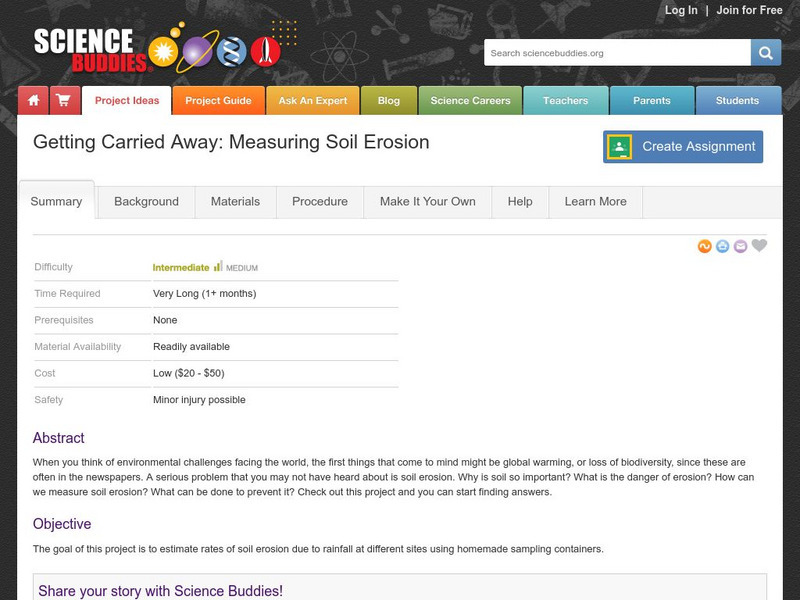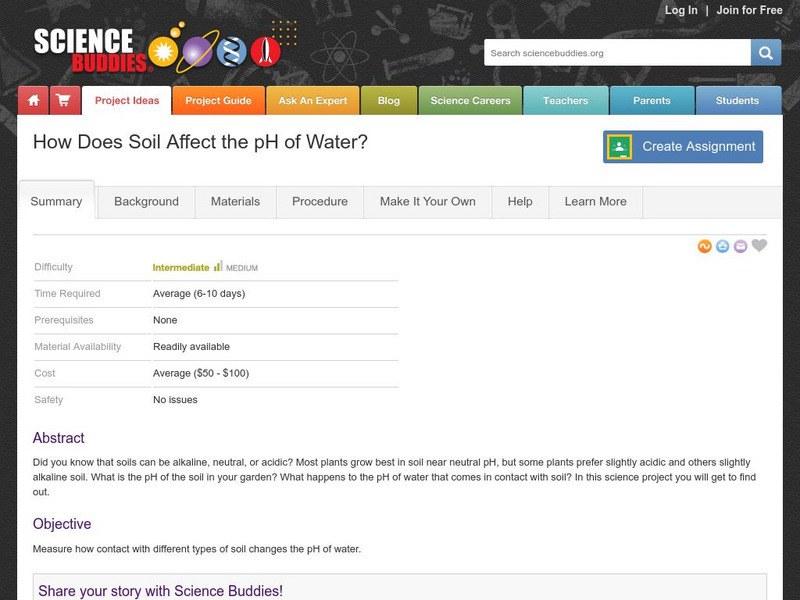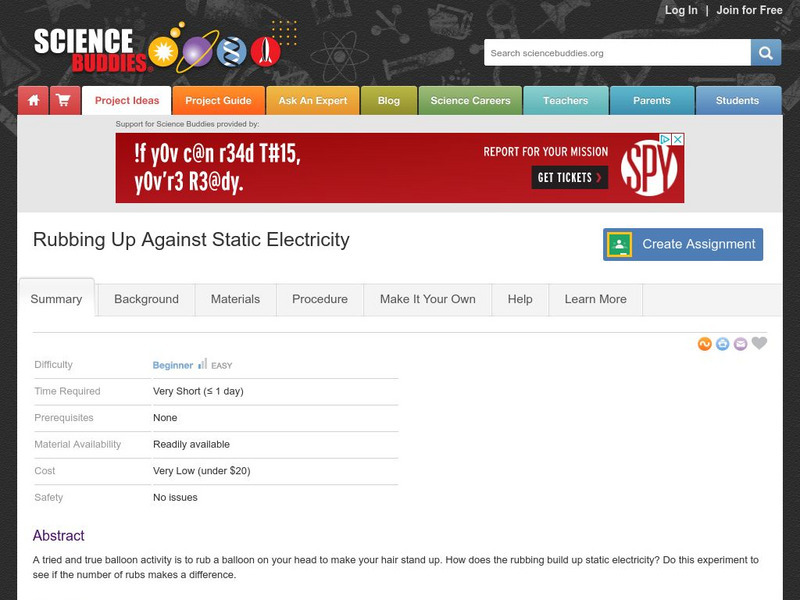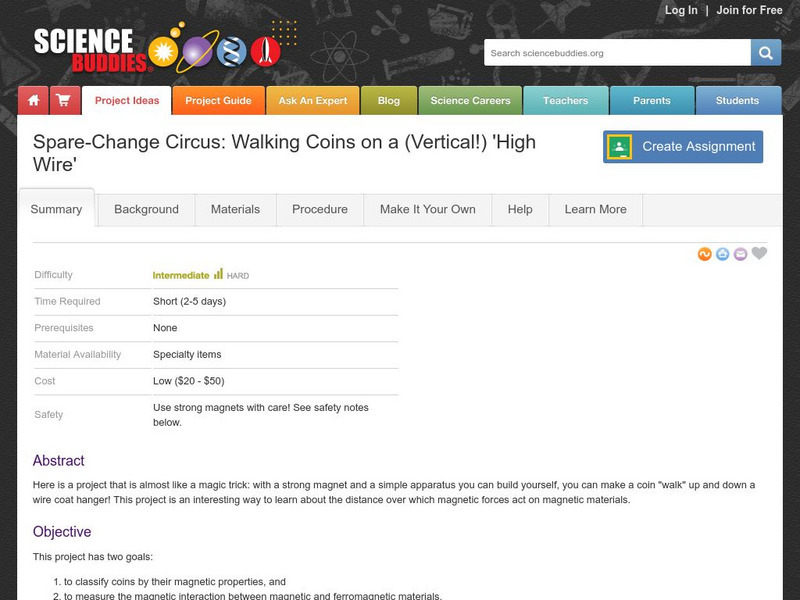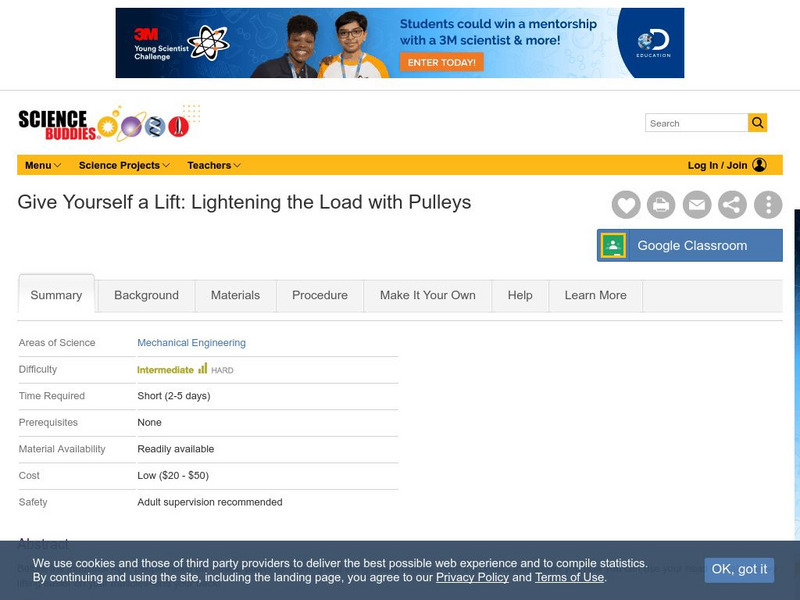Science Buddies
Science Buddies: Wild About Wildcards
The idea of a wildcard allows you to satisfy any condition. The same concept is behind using a wildcard when searching for something with your computer. Do this experiment to find out if using wildcards to conduct a search can help you...
Science Buddies
Science Buddies: Getting Carried Away: Measuring Soil Erosion
When you think of environmental challenges facing the world, the first things that come to mind might be global warming, or loss of biodiversity, since these are often in the newspapers. A serious problem that you may not have heard...
Science Buddies
Science Buddies: How Does Soil Affect the P H of Water?
Did you know that soils can be alkaline, neutral, or acidic? Most plants grow best in soil near neutral pH, but some plants prefer slightly acidic and others slightly alkaline soil. What is the pH of the soil in your garden? What happens...
Science Buddies
Science Buddies: Rubbing Up Against Static Electricity
A tried and true balloon activity is to rub a balloon on your head to make your hair stand up. Learn how the rubbing builds up static electricity using this experiment to see if the number of rubs makes a difference.
Science Buddies
Science Buddies: Understand Shock Levels and Packaging Principles
When you open up your presents on your birthday, you probably don't spend a lot of time admiring the wrapping-you'd much rather see what's inside. It can be the same way with the packaging that products come in, but packaging is...
Science Buddies
Science Buddies: Photography With Near Infrared Illumination
Have you ever wondered what it would be like to have an extra sense? What if you could hear above the normal range (ultrasound) like dogs or bats? This project shows you how you can use a camera, tripod and a special filter to take...
Science Buddies
Science Buddies: Digital Pinhole Camera
If you sit under a leafy tree on a sunny day, you may notice spots of sunlight on the ground from light passing through spaces between the leaves. Try putting a piece of cardboard on the ground and examining the spots of light on the...
Science Buddies
Science Buddies: Cd Burning: Take It to the Edge
Did you know that you can tell how much information is on a CD-R without even using a computer? Find out how in this "reflective" experiment.
Science Buddies
Science Buddies: How Do Different Materials React to Static Electricity?
Polyester clothing was generally accepted as a popular trend in fashion at one point in history. Now everybody wears cotton, which doesn't get static cling nearly as much. Why are some materials more susceptible to static cling than...
Science Buddies
Science Buddies: Digital Photo Contrast
What do you do if you take a photo and it turns out too dark or too bright? You can use your computer to fix it for you. In this experiment you will investigate how changing the contrast of a digital photo will change the colors and...
Science Buddies
Science Buddies: Rock On! Recording Digital Data With Magnets
This is a straightforward project that shows you how data can be digitized and stored on magnetic recording media. You'll learn how alpha-numeric characters are digitized, and you'll use bar magnets to represent the individual data...
Science Buddies
Science Buddies: Harmful Algal Blooms in the Chesapeake Bay
Harmful algal blooms occur when algae, which form the base of the ocean food web, grow in massive numbers and produce toxic or harmful effects on people, fish, shellfish, marine mammals, and birds. In this project you will learn how to...
Science Buddies
Science Buddies: Walking Coins on a (Vertical!) 'High Wire'
Here is a project that is almost like a magic trick: with a strong magnet and a simple apparatus you can build yourself, you can make a coin "walk" up and down a wire coat hanger. This project is an interesting way to learn about the...
Science Buddies
Science Buddies: Soil Compaction
Have you ever had to dig a hole in really hard dirt? It is a lot of work. In this experiment you can make an instrument to test the soil and find out how compacted it is, before you dig.
Science Buddies
Science Buddies: Soil Color and Moisture
When you step in mud it can be very messy. How can you tell if soil is wet or dry before you step in it? In this experiment, you can see if color can help you figure it out.
Science Buddies
Science Buddies: Porosity and Particle Size
Often, when we think of something that is solid we think about rocks. But in reality, rocks have tiny holes of air inside them. This is called porosity. In this experiment you can find out what it means to be "solid as a rock."
Science Buddies
Science Buddies: Sorting Out Sedimentation
Sedimentary rock forms in layers that are deposited one after the other over long periods of time. Oftentimes, sedimentary rock contains fossils and other debris that are deposited within the layers. Use this experiment to investigate...
Science Buddies
Science Buddies: Color Profiles
Did you know that the same digital photo you see on a computer monitor may not look as good in print? When it comes to color profiles, there are a lot of options: RGB, CMYK, grayscale and indexed color are just a few. Learn how to choose...
Science Buddies
Science Buddies: Bit Depth, Colors and Digital Photos
How many bits of information are in a digital photo? It depends on how many possible colors there are. Learn how to choose the right number of colors and bits to post your photo on the web or send it to your best friend.
Science Buddies
Science Buddies: Pinholes, Light and Aperture Size
Pinhole cameras are not a thing of the past. Even compared to all of the latest technology, a pinhole camera still gets beautiful results. Find out how this very simple aperture design works to control the way light enters the lens of...
Science Buddies
Science Buddies: Macro for Micro?
If the prefix "macro" means large and "micro" means small, then why will the macro setting of a digital camera help take a better picture of a small object? Do this experiment and get the big picture.
Science Buddies
Science Buddies: I'm Trying to Breathe Here! Dissolved Oxygen vs. Temperature
To survive, we need oxygen in the air we breathe. Oxygen is also essential for most aquatic organisms, but there is much less oxygen available in water than in air. Learn how to measure dissolved oxygen and then see how oxygen...
Science Buddies
Science Buddies: It's Raining, It's Pouring: Chemical Analysis of Rainwater
Here is an interesting project that could be approached from several different scientific angles: Environmental Science, Weather & Atmosphere, Chemistry, or Plant Biology. You can probably think of your own variations to emphasize...
Science Buddies
Science Buddies: Give Yourself a Lift: Lightening the Load With Pulleys
Before the Industrial Age, people relied on muscle power for moving and lifting heavy objects. Here's a project that shows you how you can use your head to make heavy lifting easier on your muscles - and your back.



